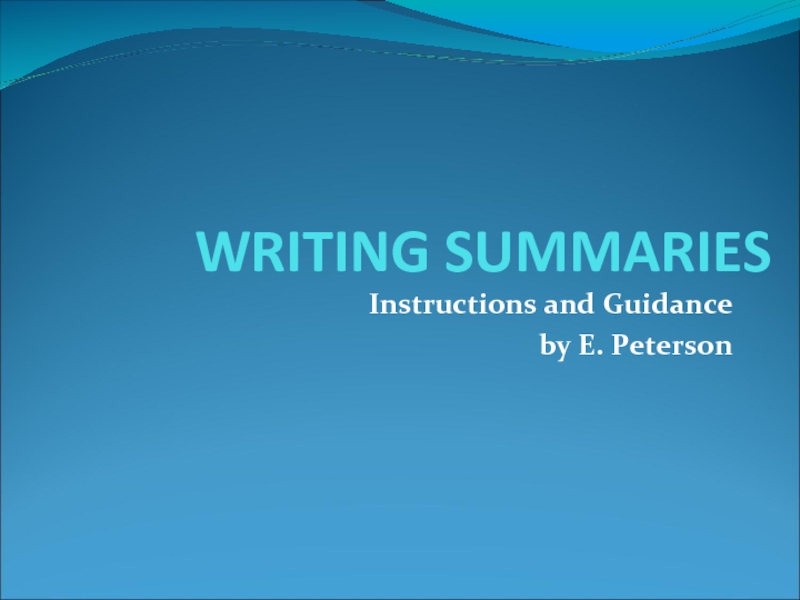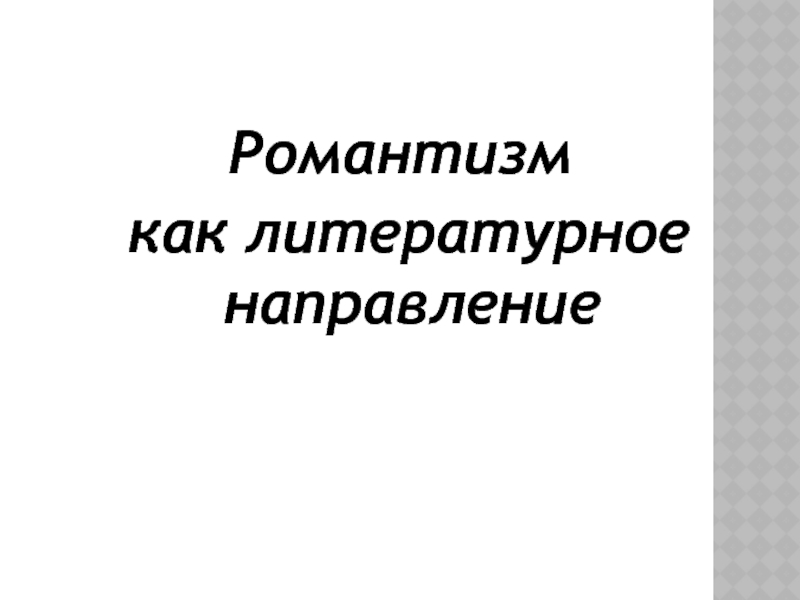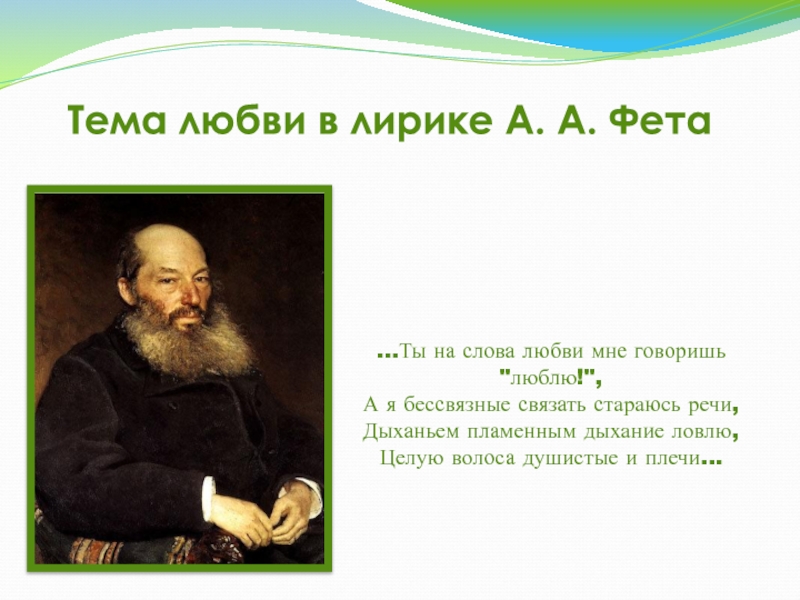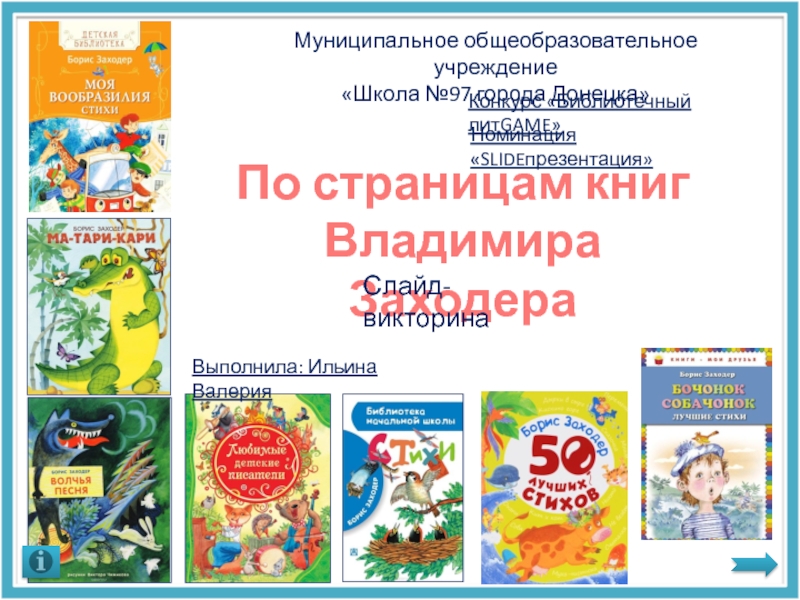- Главная
- Разное
- Дизайн
- Бизнес и предпринимательство
- Аналитика
- Образование
- Развлечения
- Красота и здоровье
- Финансы
- Государство
- Путешествия
- Спорт
- Недвижимость
- Армия
- Графика
- Культурология
- Еда и кулинария
- Лингвистика
- Английский язык
- Астрономия
- Алгебра
- Биология
- География
- Детские презентации
- Информатика
- История
- Литература
- Маркетинг
- Математика
- Медицина
- Менеджмент
- Музыка
- МХК
- Немецкий язык
- ОБЖ
- Обществознание
- Окружающий мир
- Педагогика
- Русский язык
- Технология
- Физика
- Философия
- Химия
- Шаблоны, картинки для презентаций
- Экология
- Экономика
- Юриспруденция
WRITING SUMMARIES презентация
Содержание
- 1. WRITING SUMMARIES
- 2. Reading for general understanding
- 3. Compiling a glossary Make a list of
- 4. Step 1: Writing the introduction The summary
- 5. Step 2: General information about the article
- 6. Step 3: Identifying the main purpose
- 7. Step 4: Adding supporting ideas The author
- 8. The author starts by telling about
- 9. Signalling words 1. Time/order at first, eventually,
- 10. 7. Stating the obvious after all,
- 11. 12. Condition in that case, then
- 12. Step 5: Conclusion Summarize the author`s ideas.
- 13. Checking and writing final version Check
Слайд 2
Reading for general understanding
Read the article.Underline key terms/collocations. Circle important ideas.
Re-read and understand the article.
Слайд 3Compiling a glossary
Make a list of the main ideas. Find the
important ideas - the important words/phrases. In some way mark them - write them down, underline or highlight them.
Find alternative words/synonyms for these words/phrases - do not change specialised vocabulary and common words.
Start writing the summary
Find alternative words/synonyms for these words/phrases - do not change specialised vocabulary and common words.
Start writing the summary
Слайд 4Step 1: Writing the introduction
The summary begins by citing the title,
author, source, and, in the case of a magazine or journal article, the date of publication and the text.
The article is headlined ….
The headline of the article I have read is....
The author of the ……….is……
The article (story) is written by …
The article is published in............
The article is headlined ….
The headline of the article I have read is....
The author of the ……….is……
The article (story) is written by …
The article is published in............
Слайд 5Step 2: General information about the article
This central theme is
summarized clearly and accurately in a one-sentence thesis statement. The thesis statement does not contain specific details discussed in the text.
This article provides information on....... (the growing problem and causes of noise pollution)
The article is about ….
The article is devoted to ….
The article deals with (the problem) of ….
The article touches upon the problem...
This article provides information on....... (the growing problem and causes of noise pollution)
The article is about ….
The article is devoted to ….
The article deals with (the problem) of ….
The article touches upon the problem...
Слайд 6Step 3: Identifying the main purpose
Indicate the author’s
purpose in writing: to inform, to persuade, or to entertain, ..... Omit all personal opinions, ideas, and inferences. You are reporting the author’s ideas in your own words.
The purpose of the article is to provide the reader with some material (data) on ….
The purpose of the article is to ....(inform/to persuade, to entertain, to show the advantages and disadvantages of ....., problems of ......, reasons for ..., explanations for ....
The purpose of the article is to provide the reader with some material (data) on ….
The purpose of the article is to ....(inform/to persuade, to entertain, to show the advantages and disadvantages of ....., problems of ......, reasons for ..., explanations for ....
Слайд 7Step 4: Adding supporting ideas
The author supports his/her thesis with supporting
ideas.
Cover all of the author’s major supporting ideas.
-Show the relationships among these ideas.
Omit specifics, such as illustrations, descriptions, and detailed explanations
Use signalling words
Cover all of the author’s major supporting ideas.
-Show the relationships among these ideas.
Omit specifics, such as illustrations, descriptions, and detailed explanations
Use signalling words
Слайд 8
The author starts by telling about that) …..
According to the author
(of)...
The author writes (states, stresses, thinks, points out) that ….
Further the author reports (says) that …
The article goes on to say that …
The author writes (states, stresses, thinks, points out) that ….
Further the author reports (says) that …
The article goes on to say that …
Слайд 9Signalling words
1. Time/order
at first, eventually, finally, first, firstly, in the end,
in the first place, in the second place, lastly, later, next, second, secondly, to begin with
2. Comparison/similar ideas
in comparison, in the same way, similarly
3. Contrast/opposite ideas
but, despite, in spite of, even so, however, in contrast, in spite of this, nevertheless, on the contrary, on the other hand, still, whereas, yet
4. Cause and effect
accordingly, as a consequence, as a result, because, because of this, consequently, for this reason, hence, in consequence, in order to, owing to this, since, so, so that, therefore, thus
5. Examples
for example, for instance, such as, thus, as follows
6 Generalisation
as a rule, for the most part, generally, in general, normally, on the whole, in most cases, usually
2. Comparison/similar ideas
in comparison, in the same way, similarly
3. Contrast/opposite ideas
but, despite, in spite of, even so, however, in contrast, in spite of this, nevertheless, on the contrary, on the other hand, still, whereas, yet
4. Cause and effect
accordingly, as a consequence, as a result, because, because of this, consequently, for this reason, hence, in consequence, in order to, owing to this, since, so, so that, therefore, thus
5. Examples
for example, for instance, such as, thus, as follows
6 Generalisation
as a rule, for the most part, generally, in general, normally, on the whole, in most cases, usually
Слайд 10
7. Stating the obvious
after all, as one might expect, clearly, it
goes without saying, naturally, obviously, of course, surely
8. Attitude
admittedly, certainly, fortunately, luckily, oddly enough, strangely enough, undoubtedly, unfortunately
9. Summary/conclusion
finally, in brief, in conclusion, in short, overall, so, then, to conclude, to sum up
10. Explanation/equivalence
in other words, namely, or rather, that is to say, this means, to be more precise, to put it another way
11. Addition
apart from this, as well as, besides, furthermore, in addition, moreover, nor, not only...but also, too, what is more
8. Attitude
admittedly, certainly, fortunately, luckily, oddly enough, strangely enough, undoubtedly, unfortunately
9. Summary/conclusion
finally, in brief, in conclusion, in short, overall, so, then, to conclude, to sum up
10. Explanation/equivalence
in other words, namely, or rather, that is to say, this means, to be more precise, to put it another way
11. Addition
apart from this, as well as, besides, furthermore, in addition, moreover, nor, not only...but also, too, what is more
Слайд 11
12. Condition
in that case, then
13. Support
actually, as a matter of fact,
in fact, indeed
14. Contradiction
actually, as a matter of fact, in fact
15. Emphasis
chiefly, especially, in detail, in particular, mainly, notably, particularly
14. Contradiction
actually, as a matter of fact, in fact
15. Emphasis
chiefly, especially, in detail, in particular, mainly, notably, particularly
Слайд 12Step 5: Conclusion
Summarize the author`s ideas.
The author concludes/
comes to the conclusion
that......
In conclusion,...
To sum up.....
In conclusion,...
To sum up.....
Слайд 13
Checking and writing final version
Check your rough draft of the summary.
Compare your version to the original
Be concise. Eliminate needless words and repetitions
Make sure the meaning is the same.
Make sure the length is 1/3 of the original text.
Make sure the style is your own
Check that purpose for accuracy by re-reading the
article.
Be concise. Eliminate needless words and repetitions
Make sure the meaning is the same.
Make sure the length is 1/3 of the original text.
Make sure the style is your own
Check that purpose for accuracy by re-reading the
article.


















